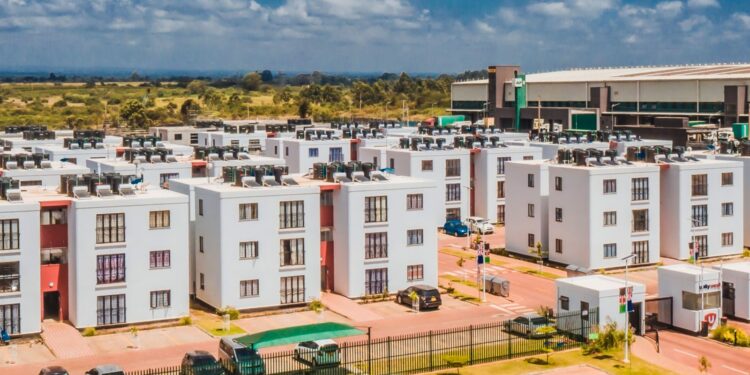Africa’s New Startup Cities Are Attracting Tenants And Billions In Capital
Initially dismissed as risky experiments, Africa’s startup cities have gained traction, with new tenancy and investments steadily flowing in as they position themselves as hubs for the growing middle class.
Seth Onyango, bird story agency
Africa’s construction boom is seeing spanking new startup cities sprout up across the continent to cater to the growing middle class, offer space for new businesses and attract international capital.
As traditional gated communities struggle to keep up with the rising number of affluent households, privately run cities are emerging as the top choice for those seeking modern infrastructure, better amenities, and secure living environments.
Rendeavor alone, Africa’s new city builder is currently constructing several startup cities in five countries on 12,000 hectares of land in Kenya, Ghana, Nigeria, Zambia and the Democratic Republic of Congo.
These include Tatu City, Appolonia City, Alaro City Roma Park, Jigna, King City, and Kiswishi, all of which are geared towards the continent’s burgeoning middle class.
Estimates from the African Centre for Technology Studies (ACTS) show there are 375 million middle-class individuals on the continent, a threefold jump from three decades ago, with this figure projected to exceed half a billion by 2030.
In 2019, the population of upper-middle-income Africans stood at 74.4 million, representing 5.6% of its population.
Now, gleaming new startup cities like Tatu City (Kenya), Eko Atlantic (Nigeria) and Konza Technopolis (Kenya) are racing to lure these burgeoning urban elites.
<script src=”https://bird.africanofilter.org/hits/counter.js” id=”bird-counter” data-counter=”https://bird.africanofilter.org/hits/story/?id=1943&slug=africa-s-new-startup-cities-are-attracting-tenants-and-billions-in-capital” type=”text/javascript” async=”async”></script>
Others in development include Milkwood City in South Africa and Rwanda’s upcoming Kigali Innovation City, all promising to redefine how modern cities can function in Africa.
Aly-Khan Satchu, a Kenyan financial analyst and CEO of Rich Management, highlighted the growing investor preference for infrastructure platforms like Tatu City.
“Investors are looking for infrastructure platforms which are plug-and-play. This is what Tatu City has achieved. They want to be immunised from poorly performing state-owned enterprises where price and service volatility is unconscionably high,” he said.
A quip about Tatu City is that its strict rules and penalties even turn the country’s most reckless drivers into law-abiding citizens.
Last week, Tatu City revealed it now has 5,000 inhabitants, four years after it opened its doors to its first residents and anticipates a peak population of 250, 000 people.
The city also hosts 88 businesses, employing 15,000 people, including CCI Global’s 5,000-seat call centre and Zhende Medical, a Chinese medical supply firm.
It has so far catalysed more than $3 billion of investment in Kenya from global brands to leading Kenyan companies.
Just last August, Huggies-maker Kim-Fay secured $5.5 million from Norwey’s Norfund and I&M Bank for Tatu City plant expansion.
Elsewhere in Kenya, Konza Technopolis which was only on paper for a long time is steadily proving its worth.
Konza, also known as “Silicon Savannah,” now has its horizontal infrastructure in place, including roads, a water treatment facility, and a modern data center.
It is designed to attract tech firms, universities, and research hubs, aiming to become a regional innovation powerhouse.
Preston Mendenhall, chief operating officer at Tatu City and country director for Rendeavour, told reporters during a recent tour that all financing for the development is sourced internally.
“All of the Rendeavor developments in Africa…Kenya, Ghana, Nigeria, Zambia, and DRC, they are demand-driven, so we build what the market needs,” he said.
“We’re not putting in all the infrastructure on day one, and we’re not going to the banks for lending. We’re fully funded internally.”
Startup cities are privately developed urban areas designed to address rapid urbanisation challenges and stimulate economic growth.
In Nigeria, Eko Atlantic is rising from reclaimed land along Lagos’s coastline.
With its gleaming skyscrapers and modern amenities, the city markets itself as a financial hub for West Africa.
Flood protection systems and innovative urban planning further cement its appeal to investors seeking stability and opportunity in one of Africa’s largest economies.
Rwanda may be a far smaller country than Nigeria but it too is making big moves to lure investment. Backed by government and private investment, Kigali Innovation City is being designed as a centre for startups, multinational corporations, and educational institutions.
Kigali’s reputation for order and efficiency offers a strong foundation for this vision of a technology-driven urban future.
South Africa’s Milkwood City is another example of this trend. Located northwest of Cape Town, it aims to tackle housing shortages while providing a modern living environment for residents.
The project also seeks to create jobs and improve access to essential services, offering a glimpse of how private cities could support broader socio-economic goals.
By blending private investment with strategic planning, they promise to deliver solutions for a rapidly urbanizing continent.
Africa is urbanising rapidly. Its population is set to hit 2.5 billion by 2050 most of whom will reside in cities. Nigeria alone will be home to nearly 190 million more urban residents than currently.
Still, critics of startup or private cities often point out that these developments prioritize exclusivity, focusing on the wealthy and neglecting broader inclusivity.
Ensuring affordability and accessibility will determine whether these cities truly redefine urban living or simply create pockets of privilege.
bird story agency








